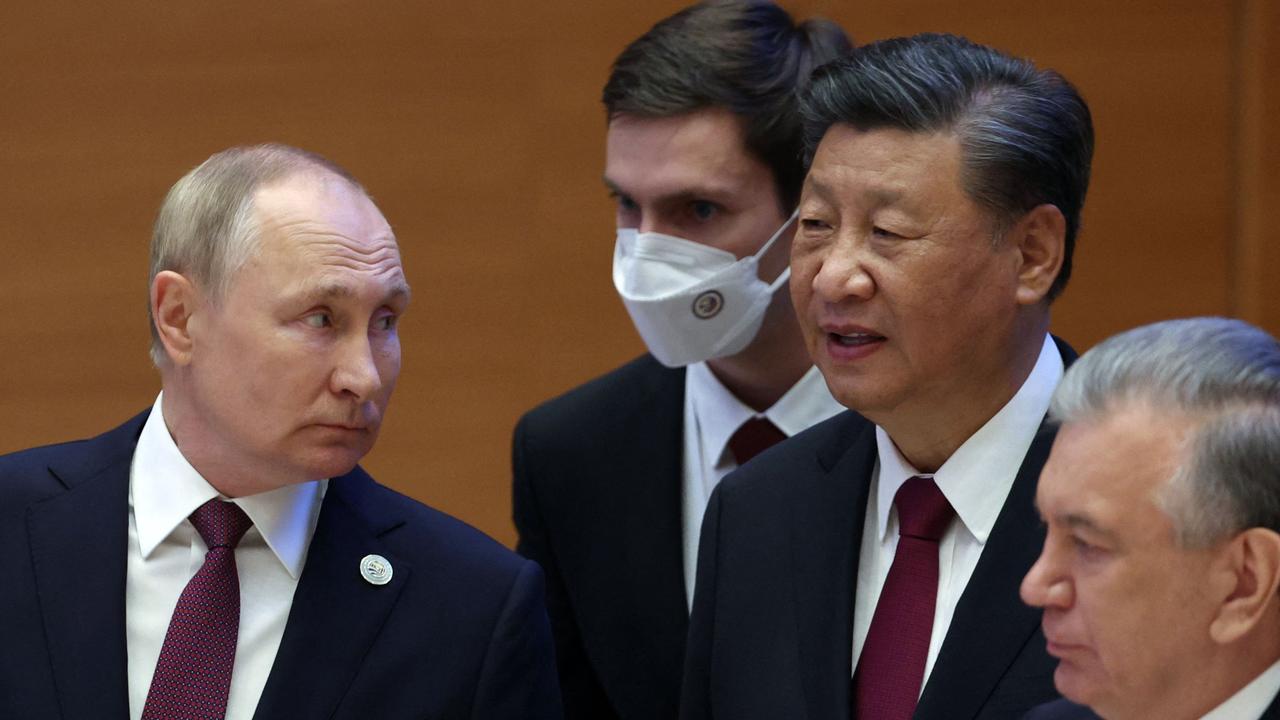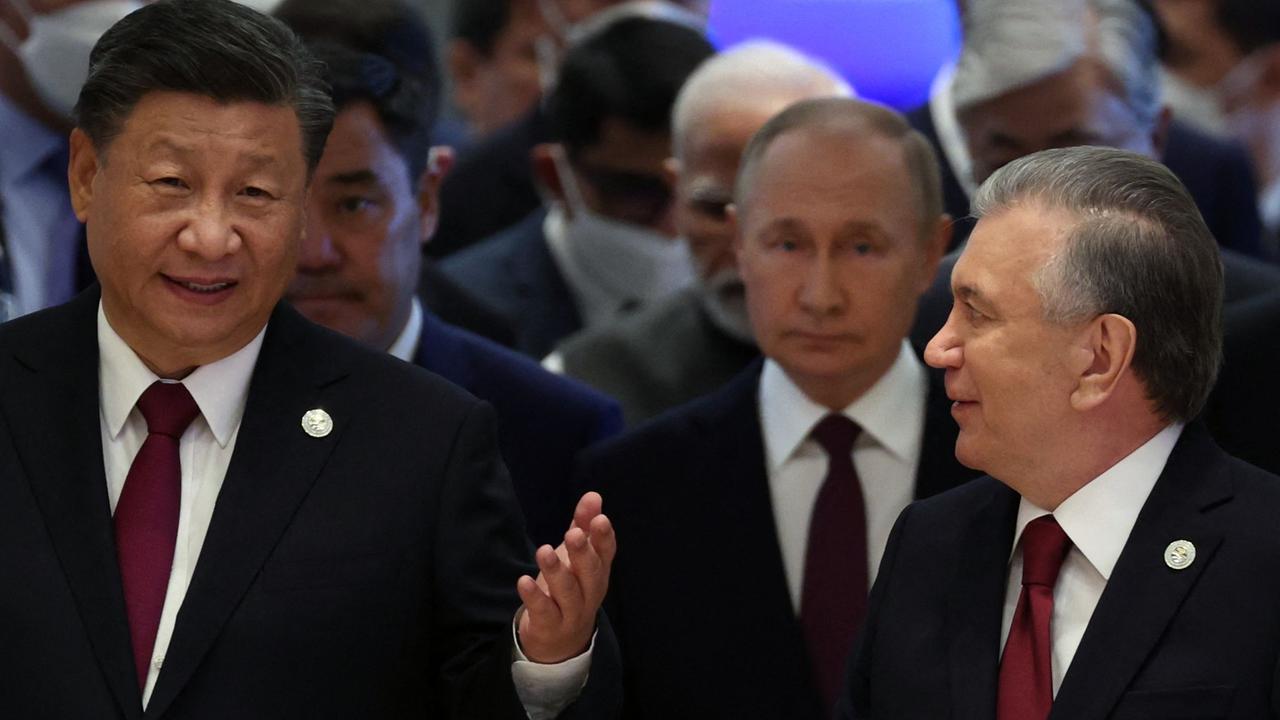China in danger of turning on ‘weak, incompetent’ Putin
Their once great friendship is being tested to its limits as Russian President Vladimir Putin “cowers” to China and is exposed as “weak” and “incompetent”.
Is Chairman Xi Jinping poised to dump President Vladimir Putin? Or is their “no limits” relationship being precisely that?
Things have changed since the two leaders declared fast friendship at the Beijing Winter Olympics in February.
Days later, Mr Putin invaded Ukraine.
Now, he’s desperately trying to save face as his forces retreat in disarray.
And that’s left international affairs analysts struggling to make sense of where the autocrats’ bromance is at.

On the surface, all didn’t appear well when the leaders of China, Russia and India met on the sidelines of the Shanghai Cooperation Organisation (SCO) in Uzbekistan last week.
“Putin may have been hoping for a continuation of the verbal, if not practical, support of Beijing and the ambivalence of New Delhi, but he received neither. Instead, both leaders expressed concerns over the invasion,” Melbourne-based political analyst Grant Wyeth writes for Australian Foreign Affairs.
But Swedish Defence University senior lecturer Sheryn Lee argues in an Australian Strategic Policy Institute (ASPI) essay that too much should not be read into this frosty encounter.
“Russian President Vladimir Putin seemed to cower in front of Chinese President Xi Jinping as he acknowledged China’s ‘questions and concern’ about Russia’s situation in Ukraine,” she writes. “But contrary to some expectations that China might see Russia as a strategic liability because of Ukraine, Ukrainian war, Beijing is likely to double down on the relationship in the short to medium term.”
Between the lines
Last week, Mr Xi urged Russia to jointly “assume the role of great powers” to introduce “stability and positive energy”.
On Wednesday, Mr Putin proclaimed his country’s “partial mobilisation” by calling up 300,000 conscripts to reinforce his failing effort in Ukraine.
This seems odd after Mr Putin chose to publicly admit Mr Xi had concerns.
“It was quite interesting that President Putin made a remark that he knew that Xi Jinping had concerns about what he was doing in Ukraine,” US deputy secretary of state Wendy Sherman said at the weekend. “Very interesting for Putin to say that.”
Mr Putin also apparently displayed displeasure at having his judgment questioned.
“Of course, we will explain in detail our position on this issue – although we have spoken about this before,” he said of his meeting with Mr Xi.
And he acknowledged that India’s President Narendra Modi had “concerns, which you continuously express”.

Such admissions demonstrate Mr Putin’s unease, says Wyeth.
“Even if Beijing continues to see Moscow as an important partner in reshaping international rules in its favour, Xi, for domestic purposes, now needs to put some distance between himself and Putin,” he argues.
“The Russian president looks weak and incompetent for being unable to force Ukraine to submission – attributes with which authoritarian regimes cannot be associated. The calculation now for Beijing is how it can use Russia’s weakness to its own benefit.”
State of affairs
“Despite his seemingly unimpressed face at the summit, Xi is unlikely to break ties with Putin over the lack of Russian progress in Ukraine,” argues Lee. “Russia simply remains too important a partner in China’s strategy to challenge the United States’ position in the Indo-Pacific.”
But it is a balancing act.
China’s foreign ministry spokesperson Wang Wenbin reacted to Mr Putin’s Wednesday mobilisation order to call for the resumption of peace talks.
“We call on all parties to achieve a ceasefire and stop the war through dialogue and negotiation, and to find a solution that takes into account the legitimate security concerns of all parties as soon as possible,” he said.
But he also took an oblique shot at the US by supporting Russia’s claim that it is behind the ongoing conflict: “We also hope the international community will create the conditions and space for this.”
Evidence of a strengthening relationship abounds.
While Mr Xi may have seemed less than enthusiastic at his face-to-face with Mr Putin last week, his Communist Party mouthpieces continue to proclaim their enthusiasm for the partnership.
Chinese officials have pledged to strengthen military co-operation through defence exercises, technology transfers, and intelligence-sharing to counter ‘foreign attempts to undermine the constitutional order’ of both countries.
“China is making tactical gains from Russia’s increasing reliance on it, which incrementally helps strengthen China’s position in the Indo-Pacific,” Lee argues.
“Defence co-operation and information-sharing agreements with Russia are contributing to China’s overall goals of eroding US military superiority in the Indo-Pacific and exploiting vulnerabilities in relations between the US and its allies.”
Economic consummation
While reluctant to publicly declare support for the invasion of Ukraine, China has been holding up its side of the relationship.
It has abstained from UN Security Council votes condemning the Russian invasion. It has opposed international economic and diplomatic sanctions. It has reinforced – through events such as last week’s SCO conference – the idea that Beijing and Moscow offer a viable alternative to the “rules-based order” of the West.
But China’s also been careful to be seen as a responsible world citizen.
“Beijing has limited collateral damage to its economic interests and diplomatic reputation by not assisting Russia to evade US and European sanctions, as well as restricting Chinese state bank financing for Russian commodity purchases,” Adjunct Professor at the Australia-China Relations Institute at UTS, Dr Michael Clarke, argues in the Lowy Institute’s Interpreter.
“Importantly, Chinese companies have also halted or paused projects with Russia.”
But Ms Lee argues that China is finding less obvious ways of providing direct support for Russia’s war effort. “Through a network of subsidiaries, Chinese firms are exporting dual-use items to Russia, including diesel engines for ships, microchips, radar components, and aluminium oxide for weapons development.”
The relationship between Moscow and Beijing is one of convenience.
And the benefit it offers to the two autocrats in control.
“Xi’s driving agenda has been the ‘struggle’ to attain the ‘China Dream’ of ‘great national rejuvenation’, and the primary obstacle to that is a truculent and declining US hegemon,” says Dr Clarke.
“Close Sino-Russian ties, from China’s perspective, are judged to be important in this context so long as they contribute to China’s economic and military strength and assist in constraining the United States.”
Jamie Seidel is a freelance writer | @JamieSeidel






